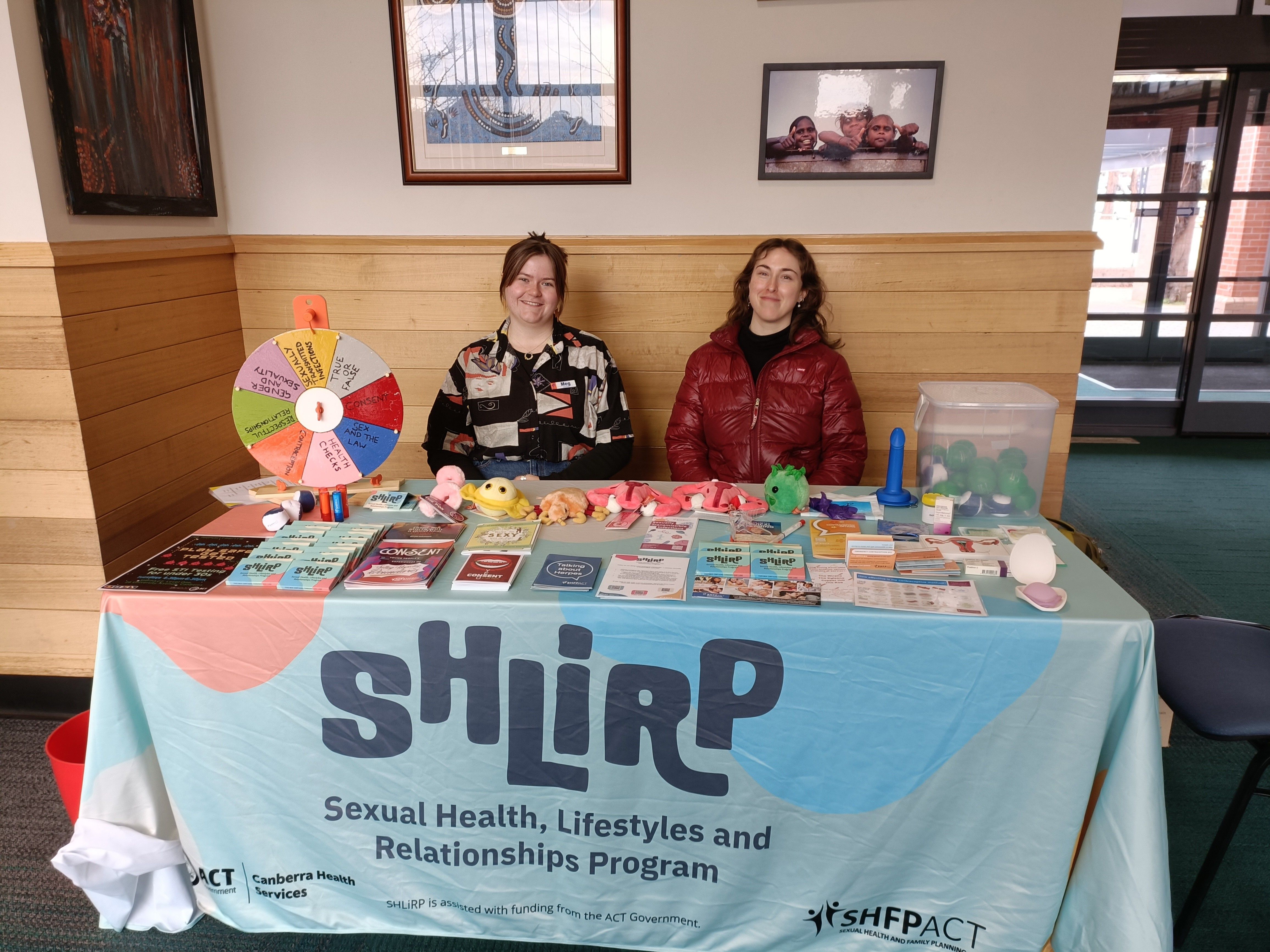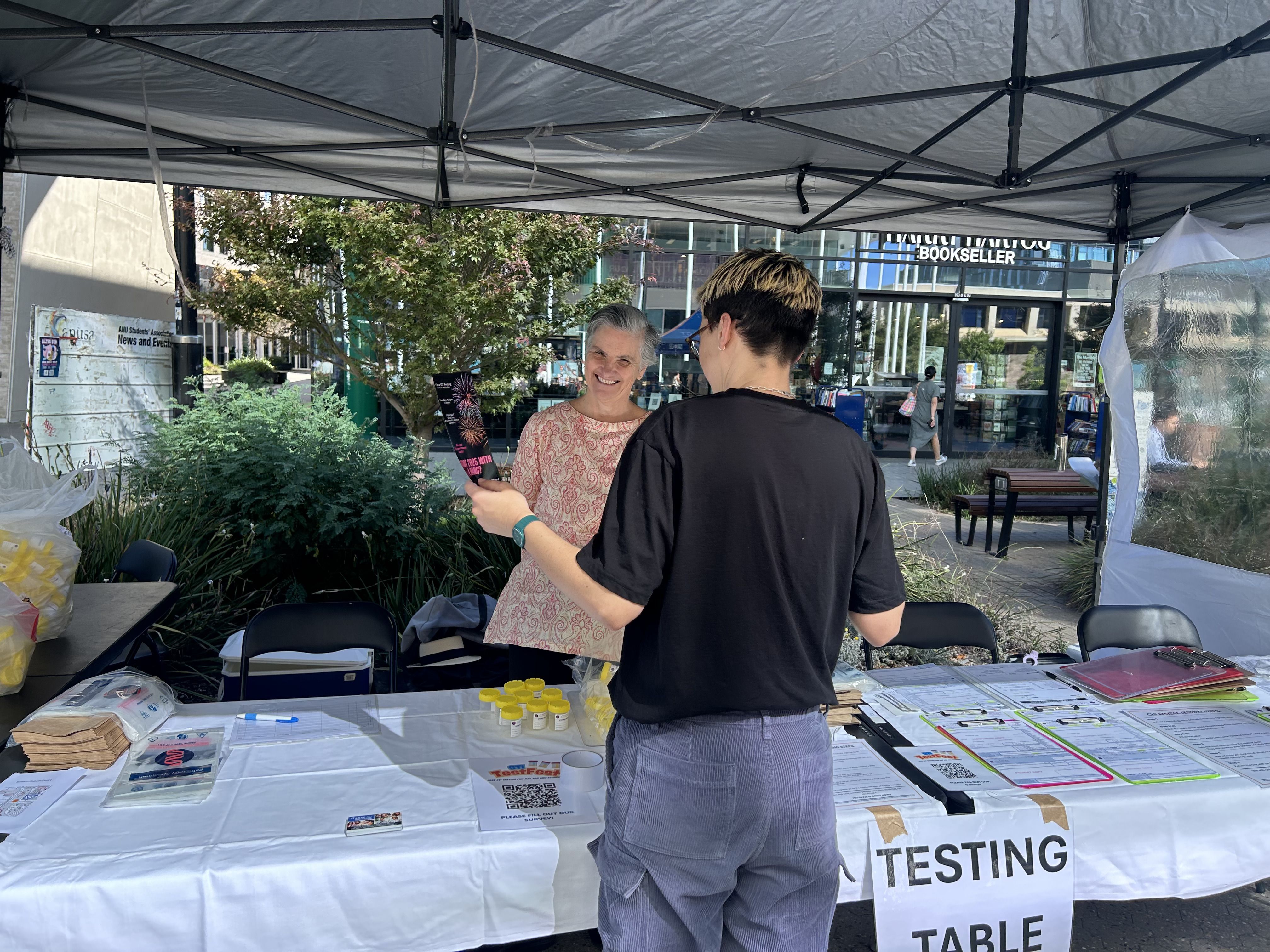Our Services

Healthcare Services
SHFPACT makes a direct contribution to ensuring high quality, accessible and affordable clinical services for the Canberra community.
- Delivering free sexual and reproductive health clinical services funded by our service funding agreement with ACT Health, including in outreach settings.
- Applying a billing concessions policy to other unfunded family planning, reproductive health and sexual health services that minimises or eliminaes the cost barrier for clients.
- Facilitating outreach clinical activities to reach individuals and communities who may not access a mainstream clinic.
The SHFPACT Clinic operates primarily on a fee-for-service basis — a bulk-billed/concession or standard fee is charged for most services. Services that are billed to or rebated by Medicare are not funded by or reported to ACT Health.
SHFPACT Access Clinic and Our Outreach Services
These services are funded by ACT Health and free to the client. At SHFPACT’s primary clinic location, these provide access to the full suite of reproductive and sexual health services at no charge, and are accessed primarily by young people and people who experience financial barriers accessing healthcare.
In outreach settings, these services are delivered primarily in partnership with outreach health education and sexual health testing activities such as the Sexual Health Lifestyles & Relationships Program (SHLiRP) with Canberra Sexual Health Centre (Canberra Health Services) to ACT senior secondary colleges, and on-campus residential colleges outreach health promotion and testing events.

Concession and Bulk-Billed Services
42% of SHFPACT’s unfunded clinic consultations were bulk-billed or low-fee services in line with SHFPACT’s own concession eligibility criteria.
The annual unfunded value to SHFPACT for the provision of low-cost consultations is over $100,000 in reduced revenue. In line with SHFPACT’s strategic financial commitments to re-invest in low-cost accessible clinical healthcare, the proportion of bulk-billed and concession fee services has been increasing each year, increasing from 31.5% in 2021-22 to 42% this year.
The routine and regular flow of patient care delivered in unfunded clinical services is central to SHFPACT’s ability to provide high quality, intensive clinical training placements for medical and nursing professionals. These workforce development and clinical training programs are substantially funded and subsidised through financial support from ACT Health.
SHFPACT Clinic continues to be a trusted referral point by general practice, and other primary and specialist healthcare services, to address more complex health needs in our areas of distinctive expertise: contraception, menopause, cervical screening, and other investigations related to important health conditions like pelvic pain and painful sex.
Unplanned Pregnancy Counselling
SHFPACT provides the only free, all-options, unbiased pregnancy counselling service in the ACT, to assist women with an unplanned pregnancy by providing information and counselling support. The service can also extend to their partner and other family members, or partner-in-pregnancy.
This service is provided at no cost to clients to reduce barriers to the service and meet the needs of young and/or financially disadvantaged women in this area, and is funded by ACT Health on an availability basis.
Continuing Teleheath Access
The availability of MBS items for telehealth services items is essential to support community access to sexual and reproductive healthcare. These items had been restricted from July 2020 until July 2021.
SHFPACT, and many other sexual and reproductive health services nationally, advocated strongly at the Commonwealth and State/Territory levels about the access impacts of this decision, which was ultimately successful in restoring access.
In 2022-23, 319 of clinic consultations were telehealth attendances. There will always need to be a balance between in-person and telehealth services in healthcare. For clients who have difficulty accessing services in-person, and for servies that are safely and appropriately provided this way, telehealth provides an effective alternative point of connection.
Pelvis Pain and Endometriosis Services
In late 2022, SHFPACT was identified as an obvious candidate as the ACT hub for new Australian Government funding for pelvic pain and endometriosis GP clinics. We were gratified by this acknowledgement by our colleagues in primary healthcare, and worked with Capital Health Network to prepare an ACT submission for the funding.
SHFPACT hosted the national announcement and launch of the new clinics by Assistant Minister for Health Ged Kearney, as one of 21 programs ultimately resourced across Australia. While the models of delivery will vary across Australia, SHFPACT’s proposal centres significantly on addressing the systemic gaps and workforce development alongside standing up a new primary care based access point.
We have valued the engagement and support of our colleagues in Canberra Health Services in establishing the project and our new service model, which represents an important evolution of SHFPACT’s scope of clinical practice.
Endometriosis and pelvic pain are notoriously poorly responded to, with limited service availability for what is a complex, dynamic and evolving experience that requires multidisciplinary care. We also recognise the opportunity that early health education on period pain and pelvic pain can potentially have on improving health outcomes over the life course for people with pelvic pain. The first consultations at SHFPACT were delivered from late September 2023.
Education and Training
Beyond direct service delivery activities in clinical services, health education and sexual health promotion, SHFPACT works towards improving the accessibility and quality of services provided to the Canberra community through our significant focus on workforce development.
These activities include:
- Medical education: including delivery in the ACT of the nationally recognised FPAA Certificate in Reproductive & Sexual Health for Doctors course, short courses on Long Acting Reversible Contraception including clinical competency assessment, and a well-regarded cervical screening skills workshop for ANU Medical School students. SHFPACT clinicians also present on key topics within the organisation’s specialist expertise for other GP and medical student programs, such as menopause and complex contraceptive management.
- Nurse education: including the Well Women’s Screening course for registered nurses (focused principally on primary care nurses), clinical attachments and observation placements for RNs building skills in sexual and reproductive health, and an ongoing placement program with the UC Midwifery program.
- Teacher education: ACT Teacher Quality Institute (TQI) accredited short courses in sexuality and relationships education for early years, primary school and secondary schools educators. In 2023, SHFPACT also provided a professional development seminar on responding to harmful sexual behaviours and building protective environments
in the school context. - ACT Safe & Inclusive Schools (SAIS) Initiative: funded by ACT Education Directorate, the SAIS Initiative provides a free, TQI-accredited course for educators in all ACT schools and education programs. The course content is an introduction to making school communities safe, welcoming and inclusive for everyone with a focus on diversity in sex, gender and sexuality.
- Community sector: SHFPACT offers a range of tailored options for workers in the community services, youth, disability support and allied health sectors to improve the knowledge and skills of workers in the areas of reproductive and sexual health, human sexuality and relationships, and social safety skills. SoSAFE! Training: SoSAFE! is a visual and
- SoSAFE! Training: SoSAFE! is a visual and conceptual framework promoting social safety and social skills, designed specifically for the learning, communication and cognitive needs of people with moderate-severe intellectual disability and people on the autism spectrum. Training programs in the use of the SoSAFE! Framework are delivered regularly throughout the year to health, education and community services workers, and parents/carers of people with disabilities.
- As part of its commitment to support the skilling and professional development of pre-service professionals across the health, education and community services industries, SHFPACT hosts placements for students in undergraduate and postgraduate study programs from a variety of vocational and tertiary education institutions. Students on placement work under the supervision of SHFPACT staff at all times, and have the opportunity to meet course learning goals in a real work context. Student placements are typically engaged on projects or activities that make a real contribution to the work and impact of SHFPACT in the community.
Professional development courses for the education/schools and community services sectors were affected by the demands on teachers and other school staff to navigate shifts to and from online learning modes, and community service providers focused significantly on their own adjustments of direct services provision in the Canberra community.
Schools Education and Community Health Promotion
SHFPACT continues to actively engage with primary and secondary schools to build the capacity of school communities to provide accurate, comprehensive, age and developmentally appropriate relationships and sexual health education.
The roles of parents/carers and teachers in the lives of children and young people are central in this endeavour, and our services are provided to support and enhance these roles, not to replace them.
SHFPACT prioritises the delivery of programs in schools to those where an existing program is in place and the use of external facilitators or guest speakers has been well considered.
Our delivery of programs directly to students supports our workforce development activities with current, credible and experienced educators providing skills development and content knowledge training to other educators across our education systems.
In the wider community, SHFPACT participates in relevant health promotion and student support and orientation events, both promoting the availability of services at SHFPACT and distributing sexual and reproductive health information.
Youth Peer Educators: The Interface Project
The Interface Project is funded by ACT Health ‘Healthy Canberra Grants’ program for two years, and is delivered in collaboration with Hepatitis ACT.
The project engages youth advocates as peer educators to develop small health promotion projects for sexual health and blood borne viruses (BBV) needs.
The youth peer educators are engaged as casual educators at SHFPACT, participate in a training and development program, participate in health education and community health promotion activities run by SHFPACT, Hepatitis ACT and other partners, and identify key sexual health and BBV issues for Canberra young people.
This project also worked with members of the Youth Advisory Council and artist BOHIE on developing health relationships and sexual consent campaign resources and materials.
We also see the project as an opportunity to build the future sexual health promotion workforce, by providing genuine employment opportunities for young people in the industry. Nine youth peer educators joined us in early 2023 for the first year of the project.
Youth peer educators worked on:
- Developing and trialling new consent education workshop materials.
- Updating the SHFPACT “Enjoying Sex Safely” health information factsheet.
- Developing new health information factsheets on Herpes and Emergency Contraception.
- Participated and provided peer review feedback on the training courses offered by ACT Safe and Inclusive Schools (SAIS) Initiative.
They attended over 30 community based health promotion activites, including supporting our partners at Hepatitis ACT on World Hepatitis Day events, and joined SHFPACT on National Condom Day distributing condoms and roses across the Canberra community.
ACT Safe and Inclusive Schools (SAIS) Intiative
The Initiative is funded by ACT Education Directorate to provide a range of supports to ACT schools and education program. saisact.info
School staff training has been a critical component of the Initiative’s activities since the program began operating in the ACT model in 2018.
Schools engagement with ACT SAIS Initiative was one of the most significantly impacted areas of SHFPACT’s work during the public health response to the global pandemic.
In 2022-23, a new extension training program was developed, piloted and accredited with the Teacher Quality Institute (TQI) for continuing professional development points for teachers.
It provides a next step for educators who completed Core Training offered by the SAIS Initiative, and engages more deeply with inclusive teaching and learning approaches, and support for students around diversity in sexuality, gender and innate sex characteristics.
n 2022-23, 250 educators and other school staff participated in ACT SAIS Initiative training courses. Participant feedback for this training is overwhelmingly positive and offers constructive criticism to improve the training course over time.
In 2022-23, 98% of participants strongly agreed or agreed that:
- The program effectively addressed the nominated Australian Professional Standards for Teachers or Australian Professional Standard for Principals.
- I gained useful knowledge and understanding through participating in this program.
- The content of the program was appropriate and valuable for my practice.
- The program description accurately reflected the content delivered and intended learning outcomes for participants.
- The program enhanced and/or affirmed my professional practice.
The Initiative is particularly proud of its longstanding association with the University of Canberra, and a regular lecture presented to pre-service teachers in the Health and Physical Education stream on gender-inclusive approaches to sport and physical education.
This presentation is also offered to Health and PE teachers already working in the school system.
Funding for SHFPACT’s delivery of the ACT SAIS Initiative was extended twice until the end of December 2023. ACT Government has released an open competitive tender for future provision of these services from 2024.
SHFPACT is submitting a collaborative proposal with our colleagues at A Gender Agenda for this program.



%20(3)-8c825ae9.png)
